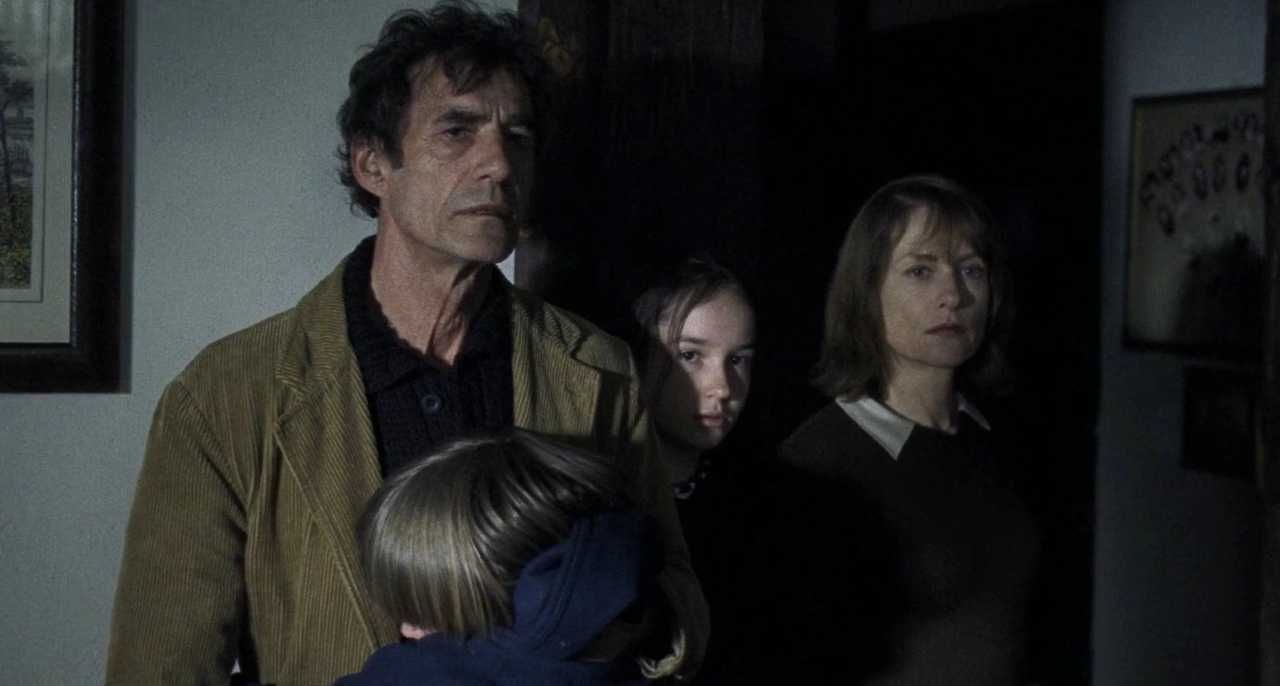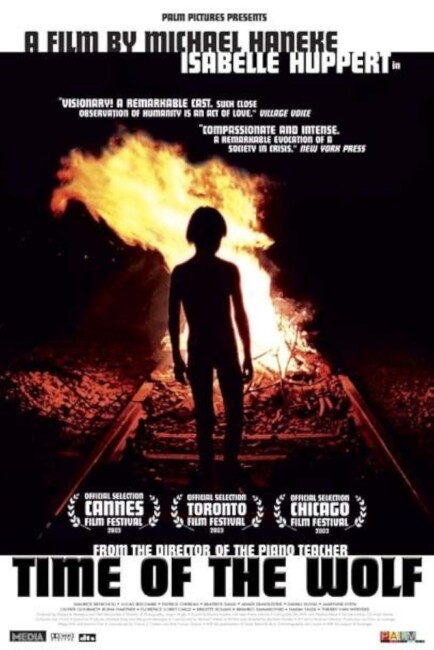(Le Temps du Loups)
France/Austria/Germany. 2003.
Crew
Director/Screenplay – Michael Haneke, Producers – Veit Heiduschka & Margaret Menegoz, Photography – Jürgen Jürges, Production Design – Christoph Kanter. Production Company – Les Films du Losange/Wega Film/Bavaria Film/Arte France Cinema/France 3 Cinema.
Cast
Isabelle Huppert (Anne Laurent), Anais Demoustier (Eva Laurent), Hakim Taleb (Young Runaway), Lucas Biscombe (Ben Laurent), Patrice Chereau (Thomas Brandt), Olivier Gourmet (Koslowski), Maurice Benichou (Mr Azoulay), Beatrice Dalle (Lise Brandt), Daniel Duval (Georges Laurent), Pierre Berriau (Fred), Brigitte Rouan (Bea)
Plot
Husband and wife Georges and Anne Laurent, along with their two children Eva and Ben, head to their cabin in the woods. They arrive only to find a family squatting there. The other man abruptly shoots Georges. With everything they have taken, Anne and the children are reduced to walking on foot. The locals who were once their friends turn them away as they beg for help and supplies. They are aided by a young runaway scavenger and thief who takes them to a nearby railway station to wait for the train that may stop there. Several others have set up a small community in the station as they wait. As a large influx of others comes, this threatens the delicate balance of the community and overstretches the scarce supplies.
Austrian director Michael Haneke has emerged as a major international name since the late 1990s. Haneke had been directing in television since the 1970s and made his feature-length debut with The Seventh Continent (1989), an observation of the dull lives of a family of protagonists who eventually commit suicide, and Benny’s Video (1992) about a boy with a video camera who is drawn in by the medium to stage violence and murder. Haneke gained attention with Funny Games (1997), a brutal work about a home invasion that gleefully turns the horror genre on its head and questions our participation. Haneke later conducted a scene-for-scene English-language remake with Funny Games U.S. (2007). These were followed by increasingly acclaimed works such as Code Inconnu (2000), The Piano Player (2001), Hidden (2005), The White Ribbon (2009), Amour (2012) and Happy End (2017), the latter seeing Haneke nominated for a Best Director Academy Award. Throughout his films, Haneke is constantly pushing characters and audiences into uncomfortable places.
Time of the Wolf is one of Haneke’s less highly regarded films – or perhaps one should say is still analysed among his other films but never gained a high profile as his other works. Haneke’s films often having a biting sting or are constructed like vicious conceptual traps around their central characters. By contrast, Time of the Wolf feels more like a French arthouse film – elliptical, more concerned with the building of long scenes and character meditations than drama and the progression of plot.
Haneke is never particularly clear about what is happening throughout. We appear to be in some near future where society is collapsing at the edges – why, we are never told. In the countryside, where the whole of the film takes place, supplies are scarce, people are nearing starvation and trains no longer appear to be stopping. Anything more than that is a mystery.

The bulk of the early sections of the film come in wide angles or long shots. There are some beautifully composed landscapes – the countryside covered in mist – and a strangely surreal sense – passing through the town square filled with a bonfire of what look like horse carcasses. The very slowness of the shots remind you of Andrei Tarkovsky – maybe you could think of Time of the Wolf as a version of The Road (2009) as directed by Tarkovsky.
The action perks up somewhat when Isabelle Huppert and children arrive at the train station. For a time, it feels like we are in a meandering quasi-apocalyptic version of Samuel Beckett as they wait for a train that never comes amid petty squabbles over social cohesion and the rules. This is interrupted with the arrival of a group of other people who overtake the station and disrupt the status quo. There are some intriguing mini-dramas here – a group determined to persecute a Pole for a perceived crime and especially when the man who killed Isabelle Huppert’s husband and his wife turns up looking for shelter and she protests about his being there and he denies it – but Haneke seems disinterested in any traditional playing off of the dramatics of these.
The last shot is the enigmatic one from the window of a train as it crosses the countryside. Quite what it means is unclear. Certainly, it offers no resolution to the scenario that we have just had. Others have sought deep meaning in all of this vague elliptical drama; I am afraid I am not one of them. I find Michael Haneke a fascinating director but Time of the Wolf with its frustrated lack of anything happening is surely his least interesting film.
Trailer here


